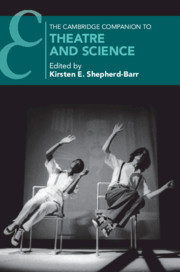Book contents
- The Cambridge Companion to Theatre and Science
- Cambridge Companions to Theatre and Performance
- The Cambridge Companion to Theatre and Science
- Copyright page
- Contents
- Illustrations
- Contributors
- Acknowledgements
- Introduction
- 1 Objectivity and Observation
- 2 Staging Consciousness
- 3 The Experimental/Experiential Stage
- 4 A Cave, a Skull, and a Little Piece of Grit
- 5 The Play at the End of the World
- 6 Bodies of Knowledge
- 7 Pathogenic Performativity
- 8 Theatres of Mental Health
- 9 Devised Theatre and the Performance of Science
- 10 Theatre and Science as Social Intervention
- 11 Acting and Science
- 12 Staging Cognition
- 13 Clouds and Meteors
- 14 ‘The Stage Hand’s Lament’
- Index
- References
6 - Bodies of Knowledge
Theatre and Medical Science
Published online by Cambridge University Press: 20 January 2021
- The Cambridge Companion to Theatre and Science
- Cambridge Companions to Theatre and Performance
- The Cambridge Companion to Theatre and Science
- Copyright page
- Contents
- Illustrations
- Contributors
- Acknowledgements
- Introduction
- 1 Objectivity and Observation
- 2 Staging Consciousness
- 3 The Experimental/Experiential Stage
- 4 A Cave, a Skull, and a Little Piece of Grit
- 5 The Play at the End of the World
- 6 Bodies of Knowledge
- 7 Pathogenic Performativity
- 8 Theatres of Mental Health
- 9 Devised Theatre and the Performance of Science
- 10 Theatre and Science as Social Intervention
- 11 Acting and Science
- 12 Staging Cognition
- 13 Clouds and Meteors
- 14 ‘The Stage Hand’s Lament’
- Index
- References
Summary
Chapter 6: This chapter discusses how, as scientific medicine gained ascendancy in the nineteenth and twentieth centuries, theatre became an important site for the examination of scientific medicine’s aspirations, achievements, limitations, and dangers. Early twentieth-century plays celebrated the pioneers of modern disease research and their accomplishments, while later twentieth- and early twenty-first century plays display a growing critique of scientific medicine and its conception of the body as an object of medical knowledge. David Feldshuh’s Miss Evers’ Boys considers the human and ethical stakes of the infamous Tuskegee syphilis study, and Suzan-Lori Parks’s Venus addresses the historical objectification of anomalous bodies. Margaret Edson’s Wit, given extensive discussion here, explores the conflict between scientism and subjectivity in the context of the modern research hospital. The medium of theatre is central to these dramatic critiques; medical science may formulate the human body as an object of knowledge, but theatre’s bodies look back in the midst of their display.
Keywords
- Type
- Chapter
- Information
- The Cambridge Companion to Theatre and Science , pp. 85 - 100Publisher: Cambridge University PressPrint publication year: 2020

